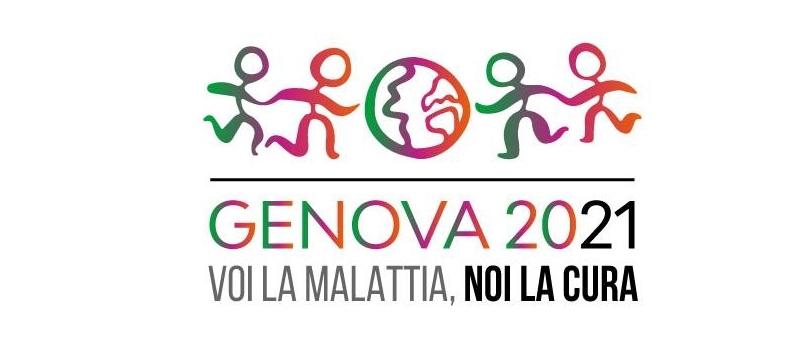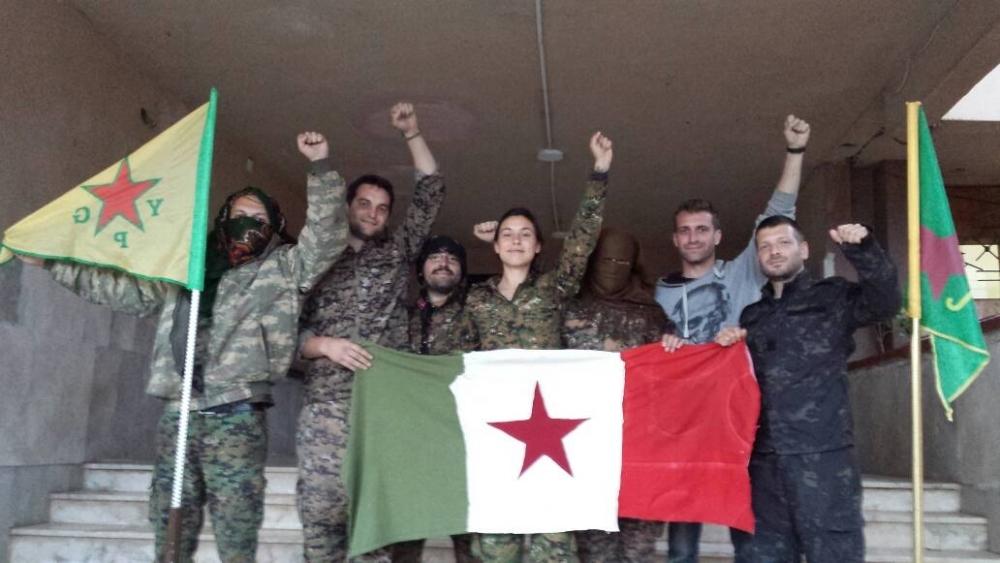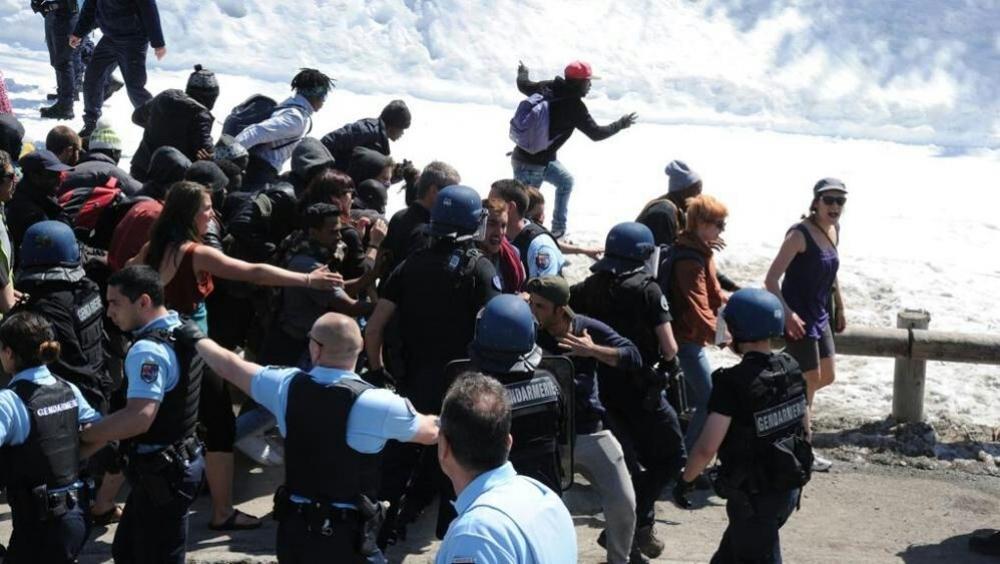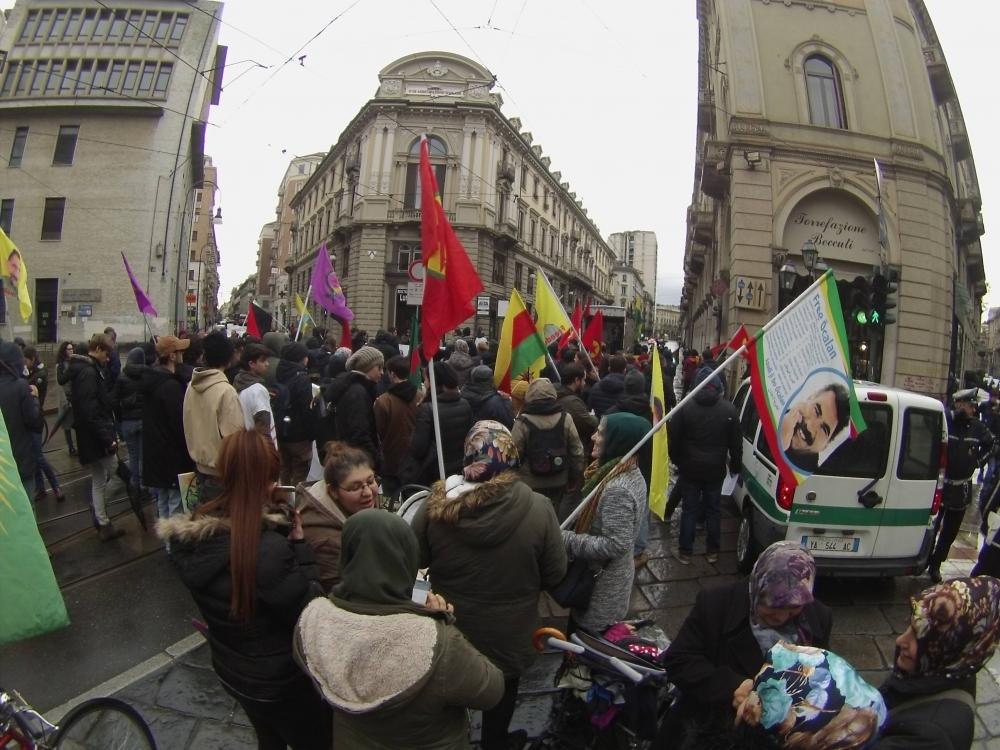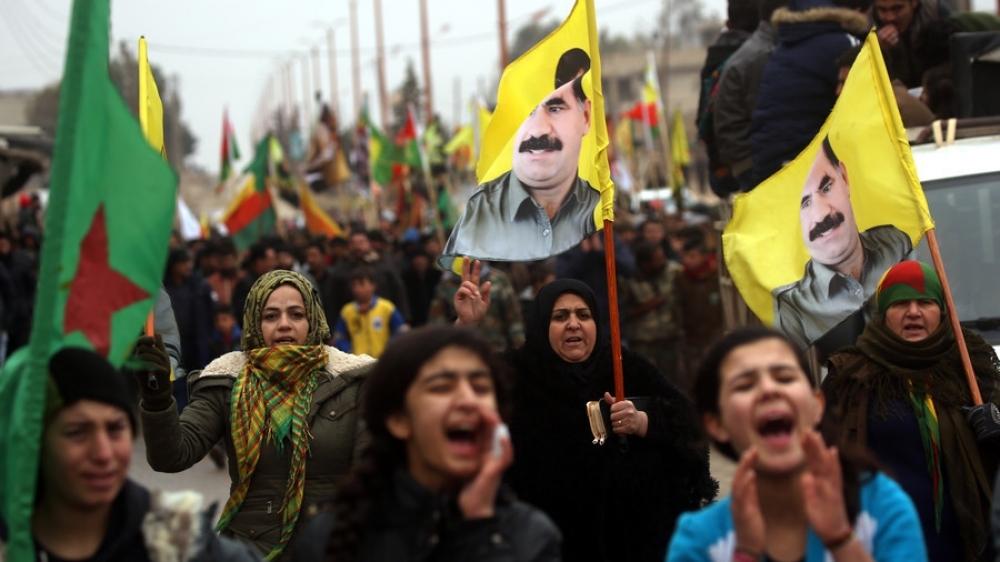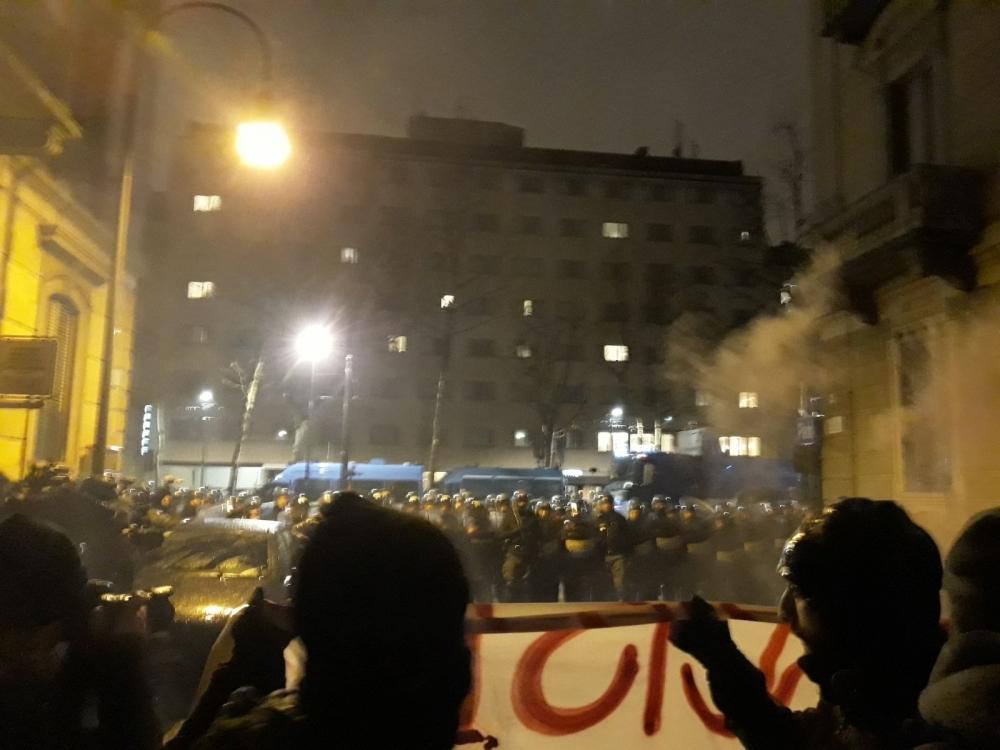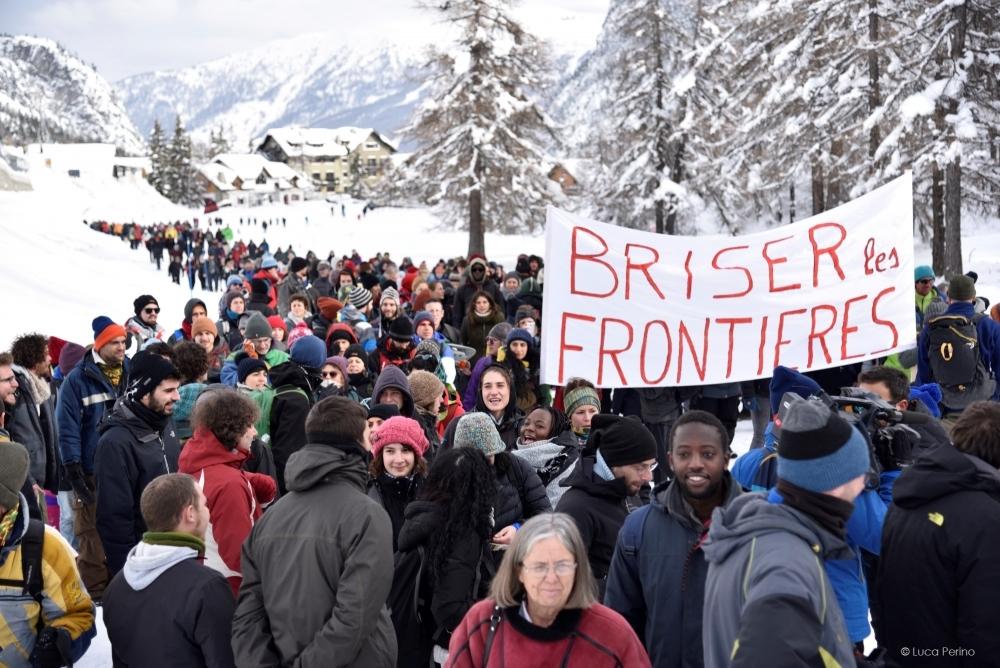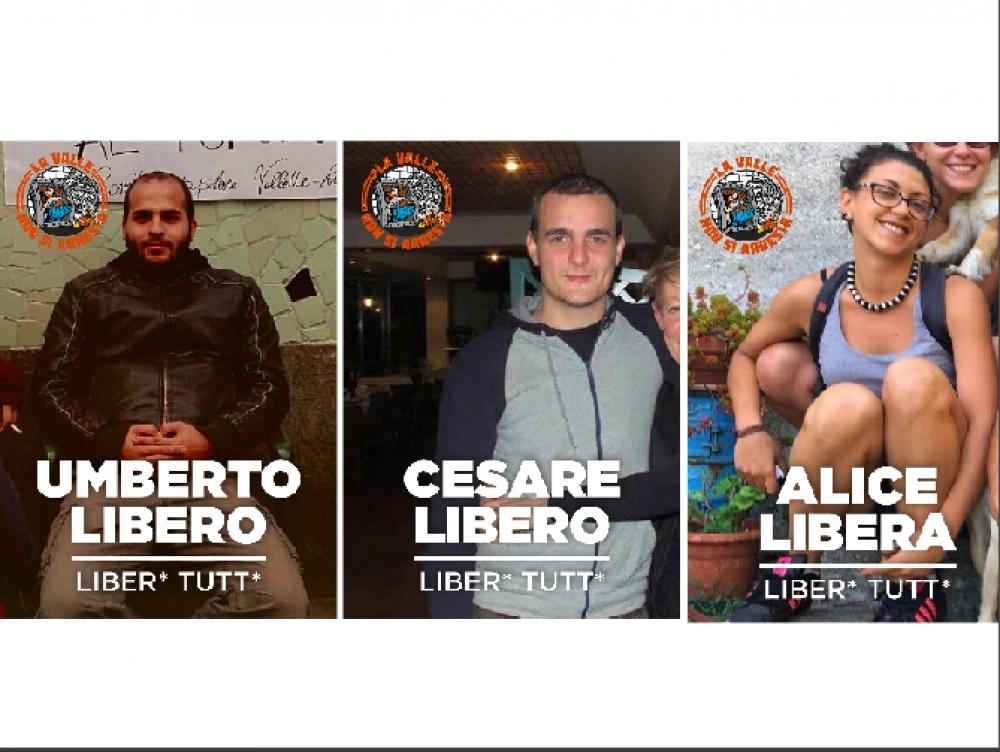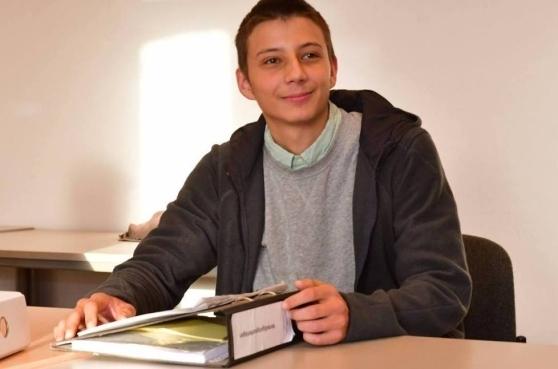Genoa G8: Comrades without justification
Five persons going to jail after being given sentences ranging from six months to fourteen years and another five waiting, in the short, for their own ones. That is how it ought to end, a history which began with three days of international demonstrations against the global agenda of Bush and Berlusconi, Putin and Blair – and three hundred thousand people screaming with rage against the global order of wars, financial speculations, environmental devastation, generalized exploitation of man by man and of woman by man. Hours and hours of clashes with the police in the whole city, direct actions, defence of the freedom to cross Genoa, attacks for the real reappropriation of Genoa and its streets trying to take them back, inch by inch from the Carabinieri [1], the police, the Minister of Interior, the barracks, the territorial class delimitation, the boastful waste of resources and luxury, the financial institutions. Three days in which the protagonists were precarious workers, students, supporters, migrants, girls and boys united by a militant choice, and eventually by a spontaneous rage; three colourful days in which Germans and Italians, Greeks and French, Americans and Palestinians joined together. Three days never to be forgotten. Three days of abuses of power ending with blood, with the murder of a comrade, the terror at Diaz school and the tortures in the Bolzaneto barracks.
Eleven years later, the State passes sentences and they are light, very light. At least for some of the top figures in the police force and practically non-existent for the goons in uniform, for those who enjoyed doing the dirty work. Very heavy for the comrades though, who were turned into scapegoats and singled out as symbols of the “devastation” of the city (a few broken shop windows!) while at the same time the masters of the planet were signing agreements which would have destroyed forests, killed oceans, militarized continents, squeezed dry and slowly killed billions of people. Surely, this kind of look on the world doesn’t fit into the penal code, in the catalogue of what is right and what is wrong to do according to the law (of the strongest that – in the case of the “pillaging and devastation” offense – democracy inherited from fascism). The penal code holds quite the opposite: the staging of arbitrary and ridiculous application of abstract rules whose historical legitimacy is yet to be defined; bent, buckled and extended to suit the convenience and use of the Magistrate – which is the convenience and use of the constituted power in its whole. Still, the sentence of July 13 doesn’t speak of papers and courts; it speaks of a whole society, of a historical period and it acquires a general meaning. As an expression of a way of being of the contemporary dominance, it is the demonstrative punishment, the pre-emptive threat, the anxiogenic revenge of an order which is fragile and untouchable at the same time, in an economically developed western country.
Three elements qualify the sentence on the political level. The first one is its discretionary character, through the ruthless use of legal phrasing that wilfully leave a boundless space to interpretation, and thus to the brutal abuse of the judge on the defendant. This is the case of such categories as “concorso morale” [2] (also present in the recently started trial against the No Tav movement) and “compartecipazione psichica” [3]; categories which consciously cancel the alleged legal guarantee of the personal character of criminal liability. If no proof can be found about a person carrying out an offense – according to the public prosecutors of Genoa and Rome (or Turin) – it will be enough to attribute her the responsibility of what someone else did; on the basis of an accusation not against the act itself, but rather the person’s intention or her psychic state in that (or even another!) moment. It is a fundamental fact, not only legally but also politically, that characterized this trial as those against the banlieusards in 2005 France, or the rioters in 2011 England, and will mark a lot of them in the future: nor individual acts neither conspiracies or actual associations, but wishes, thoughts and heartbeats are under indictment.
The second political element of the sentence is its boastfully “democratic” character: according to the prosecutor’s speech, the “devastation” carried out by the demonstrators would have canceled the possibility of any other and different expression of dissent, and that made necessary a severe prosecution of the struggling behaviour of the comrades now in jail. So, in addition to avenge Genoa’s population, that according to the Cassazione [4] was hurt by the events (and was hurt, but by complete responsibility of the G8 and the Italian government) the State throws in jail five comrades to safeguard the freedom of us all, to allow everyone of us to continue to express himself and demonstrate peacefully. Jailing the comrades protects, according to the judge, the abidance to democratic rules, that will allow, from now on, to express one’s dissent as provided by the law. Never again another Genoa: this is the judges’ warning to the young generations that in these hours are commenting, dismayed, the sentence; keep demonstrating through façades and ‘rituals’…or go back there.
The third element of the sentences is that of their pure and simple stupidity – a preset one, and of priceless value for our opponents: the inherent incapacity of the power to understand what opposes it, but the hypocrite staging of this incapacity at the same time. Indeed, in the motivations brought by the Cassazione, the aggravating circumstance of committing acts that “did not have any possible justification” subsists. According to the judge, these people today in jail are neither common no global [5] nor ordinary comrades: they are comrades which acts do not have any rational vindication. The State realizes the necessity of qualifying (besides deeming it wrong) as humanely incomprehensible the act of the radical refusal of its rules, hinting at a medicalization of dissent which once again broadens potentially out of all proportion the criteria of criminalization. And yet, the rebel melting pot that the press labeled as “black bloc” had, in Genoa, a goal. The opening century had to have not one, but two players – the law of injustice on one side and the justice which did not have its rights already matured from the other – and all the world, from the Chinese provinces to the Brazilian favelas, had to know it. This political goal didn’t and doesn’t need, nor asks for, any excuse in front of the constituted power and its officers, and its justification it is not to be found in the history wrote by the courts, not even in front of a suspicious “Judgement of History”: because sometimes these “unjustifiable” comrades seek their own vindication against history. And this is their greatness, too.
All of this is unknown to the law and to those in love with the law. We never put any hope in the justice of the institutions, as many in the G8 aftermath did (not mentioning the cheap politicians that went as far as trusting it even during the G8, and pretty often against the comrades). We knew that Placanica [6] would have never paid, and this consciousness was an integral part of a much broader knowledge, the one that enables to raise an extinguisher to resist the Carabinieri. Not to cover up: we never narrated Genoa in accordance to the do-gooder attitude of who tried by all means to remove the presence in the Movement of incompatible behaviour against public order and its police rules, or with the semantic frame of who was committed to soften the confrontation against the adverse party. They always had their description of those who faced the G8 on the ground of direct action as “infiltrators” left for themselves as the the deceitful description of us as absurd, violent and stupid nihilists. Now that the Cassazione has passed these sentences, also by partly using this untruthful representation of reality, we need to counterpose a different story at a cultural level, one that is capable of reclaiming the revolutionary Genoa wec lived through and for which a handful of comrades are paying the shameful and for us unacceptable costs for today. Its true that the events of Genoa have few certainties to present and even more are those that it has destroyed but one “proof” in the sentences in these days is to be found: that the political clash with the capitalist institutions, like it or not, is always played out on the terrain of total incompatibility.
Infoaut.org
[1] Italian military police
[2] According to Italian criminal law: expressing the same criminal aim of the material offender, so to give him a boost or an heightened sense of security in his conduct
[3] According to Italian criminal law: causing or strengthening the carrying out of an offense by others, by instigating or facilitating it
[4] Third degree of judgement in Italian Law, and its judicial body at the same time
[5] As the altermondialist demonstrators were popularly (and by press) referred to at the time
[6] Mario Placanica, the carabiniere which shot dead the demonstrator Carlo Giuliani
Ti è piaciuto questo articolo? Infoaut è un network indipendente che si basa sul lavoro volontario e militante di molte persone. Puoi darci una mano diffondendo i nostri articoli, approfondimenti e reportage ad un pubblico il più vasto possibile e supportarci iscrivendoti al nostro canale telegram, o seguendo le nostre pagine social di facebook, instagram e youtube.











